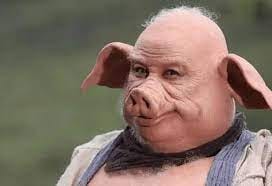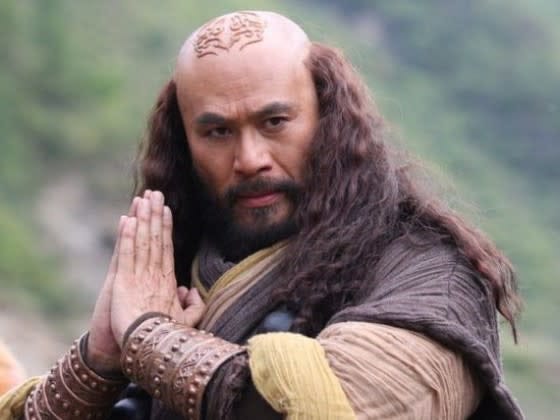Introducing Zhu Bajie, Sha Wujing and Bai Long Ma.
Meet the Sensualist, the ogre and the horse.
It’s time to meet the last three of our companions.
Zhu Baijie literally means 豬 “pig”1 八戒 “eight precepts2”. He symbolizes the gross sensual life in the absence of religious striving and mythical ambition. He is doubly comic, because as a reluctant pilgrim he has no calling whatever for the monastic life and because for all his monstrous size and strength he entertains no ambition beyond a huge meal and a good sleep with a woman in his arms. He deteriorates on the road, turning into an envious, mendacious, and cowardly glutt on obsessed with the life of sensual ease, precisely because his journey lacks incentives for worldly success and domestic contentment.
Source of this beautiful photo from a TV adaptation.
Sha Wujing is the third disciple of Tang Sanzang. His fall from grace happens when he broke a valuable jade or crystal vase or goblet, during a Heavenly Peach Festival. He was punished by the Jade Emperor3, who had him struck 800 times with a rod and exiled to earth, where he was to be reincarnated as a terrible man-eating sandman, orc, ogre or monster. Guanyin4, the bodhisattva5 of compassion, and her disciple, Prince Moksha6, came searching for powerful bodyguards in preparation of Tang Sanzang's journey west. She recruited Wujing, in exchange for which, she granted some respite from his suffering. She then converted him to Buddhism and gave him his Dharma name, Shā Wùjìng (沙悟淨); his surname Shā ("Sand") was taken from his river-home, while his given name Wùjìng means "Awakened-to/Aware-of Purity".
Just picture a white horse.
Bai Long Ma (lit. 白龍馬 ‘white dragon horse’) was once a magnificent dragon called Ao Lie (lit. 敖烈 ‘strong heir’), the third son of the Jade Dragon, King of the West Sea. However, after setting fire to a sacred temple and destroying a precious pearl bestowed upon them by the Jade Emperor, he was sentenced to death. Before carrying out his sentence, the Jade Emperor held him upside down and struck him 300 times for his carelessness and disobedience when Guanyin appeared and pleaded for his life. As a result, rather than being executed, he would be demoted to the human realm to await the monk, Tang Sanzang, and join him on his pilgrimage to the west.
Congratulations! You have met all the characters. Now let’s start the journey.
In Chinese folklore, pigs are sometimes symbols of sloth, self-indulgence, intemperance, and lack of any kind of self-control.
In Buddhism, the eight precepts is a list of precepts that are observed by lay Buddhists on observance days and festivals. They include general precepts such as refraining from killing, stealing, but also more specific ones, such as abstaining from cosmetics, sexual activity, and entertainments.
The Jade Emperor, in Chinese culture, traditional religions and myth is one of the representations of the first god.
In Chinese mythology, Guanyin is the goddess of mercy and considered to be the physical embodiment of compassion.
In Buddhism, a bodhisattva is a person who is on the path towards bodhi ('awakening') or Buddhahood.
The definition and meaning of moksha varies between various schools of Indian religions. Moksha means freedom, liberation; from what and how is where the schools differ. The prince is a personification of this concept.



Really interesting, can't wait for the first chapter!